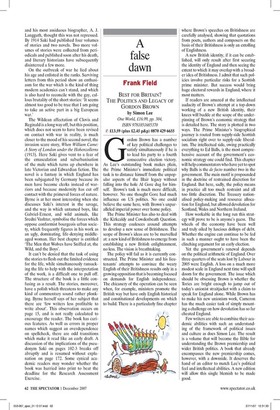A false dawn
Frank Field BEST FOR BRITAIN? THE POLITICS AND LEGACY OF GORDON BROWN by Simon Lee One World, £16.99, pp. 304, ISBN 9781851685370 £13.59 (plus £2.45 p&p) 0870 429 6655 Gordon Brown has a number of key political challenges to satisfy simultaneously if he is to lead his party to a fourth consecutive election victory. As Lee's outstanding book makes plain, the Prime Minister's immediate political task is to distance himself from the unpopular aspects of the Blair legacy without falling into the hole Al Gore dug for himself. Brown's task is much more difficult, however. No one thought Gore had much influence on US politics. No one could believe the same here, with Brown's unparalleled imperial power over home policy.
The Prime Minister has also to deal with the Kirkcaldy and Cowdenbeath Question. This strategy coalesces around attempts to develop a new sense of Britishness. The scope of Brown's ideas are to be marvelled at: a new kind of Britishness to emerge from establishing a new British enlightenment, no less. The vision is breathtaking.
The policy will fail as it is currently constructed. The Prime Minister and his lieutenants' attempts to convince the weary English of their Britishness results only in a growing opposition that is becoming focused on demands for English independence. The chicanery of the operation can be seen when, for example, ministers promote the British way but have only English historical and constitutional developments on which to build. There is a particularly fine chapter where Brown's speeches on Britishness are carefully analysed, showing that quotations from poets, authors and composers on the basis of their Britishness is only an extolling of Englishness.
A new British identity, if it can be established, will only result after first securing the identity of England and then seeing the extent to which it may overlap with a broader idea of Britishness. I admit that such policies involve particular risks for a Scottish prime minister. But success would bring huge electoral rewards in England, where it most matters.
If readers are amazed at the intellectual audacity of Brown's attempt at a top-down working of a new British identity, their knees will buckle at the scope of the underpinning of Brown's economic strategy that is detailed here. The story is plotted in two ways. The Prime Minister's biographical journey is routed from supply-side Scottish socialism right over to supply-side liberalism. The intellectual side, owing practically everything to Ed Balls, is the most comprehensive account of the government's economic strategy one could find. This chapter will help commentators who have yet to spot why Balls is the de facto number two in the government. The main motif is propounded in the doctrine of restrained discretion for England. But here, sadly, the policy means in practice all too much restraint and all too little discretion. The Treasury nationalised policy-making and resource allocation for England, but allowed devolution for Scotland, Wales and Northern Ireland.
How workable in the long run this strategy will prove to be is anyone's guess. The wheels of the economy have been well and truly oiled by luscious dollops of debt. Whether the engine can continue to be fed in such a manner ought to have been the clinching argument for an early election.
Yet the government's renewal depends on the political arithmetic of England. Over three quarters of the seats lost by Labour in 2005 were English. A loss on a much more modest scale in England next time will spell doom for the government. The issue which should be obsessing Brown is whether the Tories are bright enough to jump out of today's unionist straitjacket with a claim to speak for England alone. While Brown has to make his new unionism work, Cameron has the much easier task of simply mounting a challenge on how devolution has so far cheated England.
Few writers are able to combine their academic abilities with such an understanding of the framework of political issues and culture as does Simon Lee. The result is a volume that will become the Bible for understanding the Brown premiership and wider British politics. A book that already encompasses the new premiership comes, however, with a downside. It deserves the hand of an editor to match Lee's political feel and intellectual abilities. A new edition will allow this single blemish to be made good.





































































 Previous page
Previous page